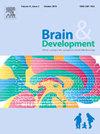Endocrinological study of low-dose adrenocorticotropic hormone therapy without tapering in infantile epileptic spasms syndrome
IF 1.3
4区 医学
Q4 CLINICAL NEUROLOGY
引用次数: 0
Abstract
Background
Adrenocorticotropic hormone (ACTH) therapy is effective for infantile epileptic spasms syndrome (IESS) and other types of refractory epilepsy; however, concerns remain regarding the risk of potential adrenal insufficiency, particularly when ACTH therapy is discontinued without dose tapering. Studies on comprehensive endocrinological evaluation of adrenocortical function following low-dose ACTH therapy without tapering are limited.
Methods
We collected the data of patients who were diagnosed with IESS and received ACTH therapy using synthetic ACTH at 0.005–0.0125 mg/kg/day (equivalent to natural ACTH at 0.2–0.5 IU/kg/day) for 14 days without tapering, and underwent an ACTH stimulation test following ACTH therapy completion for adrenocortical function evaluation. Moreover, body weight, blood pressure, and electrolytes were measured before and after treatment.
Results
A total of 11 patients, aged between 3 months and 1 year and 6 months, were enrolled. ACTH therapy was effective in all 11 patients. During the observation period, 3 patients developed seizure recurrence; however, none of the patients exhibited symptoms of adrenal insufficiency. The ACTH stimulation test confirmed normal adrenocortical function in all cases, with peak cortisol levels exceeding 20 μg/dL. After treatment, a significant increase in body weight and blood pressure were observed.
Conclusion
Low-dose ACTH therapy without tapering can be endocrinologically safe. The result provides useful information for reducing hospitalization duration and minimizing side effects. To validate these findings, further studies with larger cohorts are needed.
低剂量无减量促肾上腺皮质激素治疗婴儿癫痫痉挛综合征的内分泌学研究
背景促肾上腺皮质激素(ACTH)治疗对婴儿癫痫痉挛综合征(IESS)和其他类型的难治性癫痫有效;然而,人们仍然担心潜在的肾上腺功能不全的风险,特别是当ACTH治疗停止而不减量时。低剂量无减量ACTH治疗后肾上腺皮质功能的综合内分泌学评价研究是有限的。方法收集诊断为IESS的患者资料,采用合成ACTH剂量为0.005-0.0125 mg/kg/天(相当于天然ACTH剂量为0.2-0.5 IU/kg/天),连续14天不减量的ACTH治疗,并在ACTH治疗结束后进行ACTH刺激试验,评估肾上腺皮质功能。治疗前后测量体重、血压、电解质。结果共纳入11例患者,年龄在3个月至1岁6个月之间。11例患者ACTH治疗均有效。观察期内癫痫复发3例;然而,没有患者表现出肾上腺功能不全的症状。ACTH刺激试验证实所有病例肾上腺皮质功能正常,峰值皮质醇水平超过20 μg/dL。治疗后,观察到体重和血压显著升高。结论无减量的低剂量促肾上腺皮质激素治疗是内分泌安全的。结果为缩短住院时间和减少副作用提供了有用的信息。为了验证这些发现,需要进行更大规模的进一步研究。
本文章由计算机程序翻译,如有差异,请以英文原文为准。
求助全文
约1分钟内获得全文
求助全文
来源期刊

Brain & Development
医学-临床神经学
CiteScore
3.60
自引率
0.00%
发文量
153
审稿时长
50 days
期刊介绍:
Brain and Development (ISSN 0387-7604) is the Official Journal of the Japanese Society of Child Neurology, and is aimed to promote clinical child neurology and developmental neuroscience.
The journal is devoted to publishing Review Articles, Full Length Original Papers, Case Reports and Letters to the Editor in the field of Child Neurology and related sciences. Proceedings of meetings, and professional announcements will be published at the Editor''s discretion. Letters concerning articles published in Brain and Development and other relevant issues are also welcome.
 求助内容:
求助内容: 应助结果提醒方式:
应助结果提醒方式:


